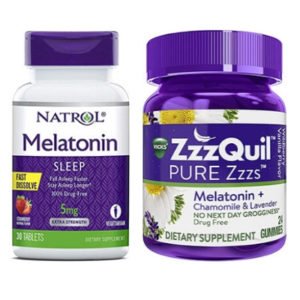It is always a good idea to try non-drug treatments first, but of all fails, here is how common over the counter sleep aids and natural sleep aids stack up.
Over the counter sleep aids (antihistamines such as Simply Sleep and Unisom). Do they work? It is minimally effective in the short term. Recommended? Only for short-term use (1-2 days). After that, they may cause daytime drowsiness and vision problems.
Melatonin (an herbal supplement). Does melatonin work? Yes, in the short-term, but only for people experiencing jet lag or working the night shift. Should you take melatonin supplements? May be worth a try. Side effects may include sleep disruption, irritability and daytime fatigue.
Valerian (an herbal supplement). Does valerian work? Yes, when used in moderation. Should you take valerian supplements? No. It can be over-sedative and may cause liver damage.
Nonbenzodiazepines (such as Ambien, Sonata and Lunesta). Does it work? Yes. Should you take it? Yes. Side effects may include drowsiness and slight impairment of coordination and response time.
Benzodiazepines (such as Halcion, Restoril and ProSom). Does it work? Yes. Should you take it? No. These have a higher risk of dependency and multiple withdrawal symptoms.
Antidepressants (not FDA-approved for insomnia) (such as trazadone and Remeron). Do they work? Yes and no. They may increase total sleep time, but they suppress deep REM sleep so you may feel less well-rested. Recommended?
I would not take them. They can be useful for people who also suffer from depression – experts discourage its use fro sleep problems alone – but side effects include dry mouth, weight gain and dizziness. [via]

